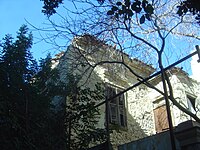Napoleon Lapathiotis
Napoleon Lapathiotis (Greek: Ναπολέων Λαπαθιώτης; 31 October 1888 – 7 January 1944) was a Greek poet. A native of Athens, he began writing and publishing poetry when he was eleven. In 1907, along with others, he established the Igiso (Ἡγησώ, from the Attic Greek name Hēgēso) magazine, in which he published his works.[1] In 1909, he graduated from the law school of the University of Athens.[1] His only book of poems while alive was published in 1939; in 1964, Aris Diktaios published his poems posthumously.[1]
Personal life[edit]
Lapathiotis was openly gay and had communist beliefs.[2] Poor in later life and an opium addict, he committed suicide with a revolver on 7 January 1944.[3]
The 1985 film Meteor and Shadow was based on his life.[4]
Poems[edit]

Famous poems by Lapathiotis include:
- Τὰ καημένα τὰ πουλάκια
- Τὰ χλωμά τὰ κοριτσάκια
- Ἔχω ἕνα ἀηδόνι...
- Ποιητής
- Μυστικό...
- Ἐπεισόδιο
- Ἡ χαρά
- Συντριβή
- Ἀναμνήσεις
- Our old song (Τὸ παλιό μας τραγοῦδι)
- Small song (Μικρὸ τραγοῦδι)
- Παραμύθι
- Πόθος
- Στὴ νυχτερινὸ κέντρο
- Χειμωνιάτικο τοπίο
- Ἐκ βαθέων
- Στὴ φυλακή...
- Κούραση
- Κλείσε τὰ παράθυρα
- Φαντάσματα
- Βαθύ κι ἐξαίσιο βράδυ
- Μοναξιά
- Ἑκάτης πάθη
- Νυχτερινό
- Οἱ μπερντέδες
- Ἐρωτικό
- Οἱ κύκνοι τὸ φθινόπωρο
- Λυπήσου
- Προσμένω πάλι
- Σπαρασμός
- Untitled (Ἄτιτλο)
- 1939
- Φάντασμα
- Προσμονή
- Εἶμαι μόνος...
- Ἐρινύες
- Vao, ghao, dhao (Βαο, γαο, δαο)
- Τ᾿ ἁπλὸ παιδί πού ἐγὼ ἀγαπῶ...
- Song (Τραγούδι)
- Ὅταν βραδιάζει
- Ἕνας χαμένος κύκλος
- Ἀποχαιρετισμοί στη μουσική
- Ἀποχαιρετισμός
- Ἀποχαιρετιστήριο
- Κραυγή
Other works[edit]
- My Life (Ἡ Ζωή μου), unfinished autobiography
- Nero the tyrant (Νέρων ὁ Τύραννος), 1901, theatrical play for children
References[edit]
- ^ a b c Dapoudani, Aleksandra Marina (December 2022). "The Suicidal of Modern Greek Poet Napoleon Lapathiotis (1888-1944) and the Ancient Greek Mythological Symbol of Narcissus and Rose". Journal of Balkan and Black Sea Studies. 5 (9): 87–104.
- ^ Eleanor Mannikka (2007), "Meteoro kai Skia", Movies & TV Dept., The New York Times, archived from the original on 2007-12-13, retrieved 2008-01-04
- ^ Cornucopia, etc. by Alex Moskios
- ^ "Meteor and Shadow". Thessaloniki Film Festival. Retrieved 10 March 2024.
External links[edit]
- 1888 births
- 1944 suicides
- Gay poets
- Modern Greek poets
- Writers from Athens
- Suicides by firearm in Greece
- National and Kapodistrian University of Athens alumni
- 20th-century Greek poets
- Greek male poets
- Greek gay writers
- 20th-century Greek male writers
- Greek LGBT poets
- 1944 deaths
- Greek poet stubs
- 20th-century Greek LGBT people
